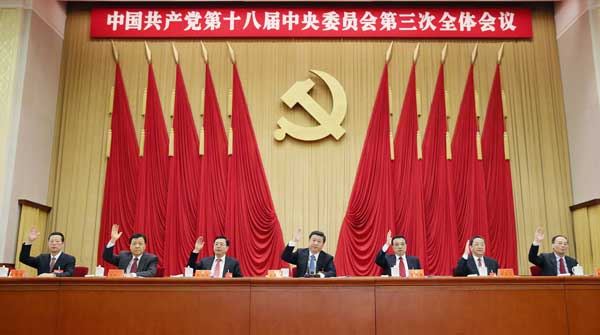Leadership charts path
|
President Xi Jinping (center), Premier Li Keqiang (third from right) and other members of the Standing Committee of the Political Bureau of the Communist Party of China Central Committee vote for a reform plan at the Third Plenary Session of the 18th CPC Central Committee, held from Saturday to Tuesday in Beijing. Lan Hongguang / Xinhua |
Modernization of 'governance system' and 'governance capability' envisioned in plan
China is to commission a specialized high-level group to design and coordinate the country's "great revolution" of reform and opening-up. The move comes 10 years after the ministry-level economic reform commission was merged with the former State planning commission into the National Development and Reform Commission.
The new Central Reform Leading Group is likely to be an even higher-level body than the former economic reform commission, think-tank researchers said.
The new leading group will probably be positioned at the same level as the Central Finance and Economy Leading Group, said Liu Fuhuan, from the Academy of Macroeconomic Research under the National Development and Reform Commission.
Part of the new group's duties, apart from economic reform, is to plan and carry out reform on modernizing China's "governance system" and "governance capability".
These two new concepts were raised at the Third Plenary Session of the 18th Communist Party of China Central Committee, a four-day meeting that ended in Beijing on Tuesday.
Wang Yukai, a professor at the Chinese Academy of Governance, said administrative reform will be a major component in China's next round of reform, adding that it will also result in less interference with the market.
In a communique that mentioned the word "market" 22 times, Chinese leaders attributed the "decisive role" of the market economy in allocating resources. The communique pledged to speed up the building of China's modern market system, its macroeconomic stewardship and its open economic system.
It also vowed to speed up transition of the economy's growth model and promote innovation to facilitate China's more efficient, more equitable and more sustainable development.
The core issue of the reform, as pointed out in the communique, is to "better handle the relationship between government and the market".
While regarding reform of the economic system as the key part of a broader reform agenda, the communique calls for "letting the market play a decisive role in allocating resources, while letting the government play its part better".
The role of the market has been taken to an unprecedented level in China since it adopted a socialist market economy in 1993, when the Party tentatively defined the market's role as "basic" in allocating resources.
The unprecedented emphasis is expected to bring more market vitality, competition and equal access in otherwise monopolized sectors, analysts said.
Zhang Zhuoyuan, an economist at the Chinese Academy of Social Sciences who attended the meeting, regards the "decisive role of the market" as the most important reform mentioned in the communique.
"It is apparent the market will gain more say in the allocation of resources, while less room is left for the government," he said.
Zhang said the meeting only set a broad reform agenda. Ministries and other administrative authorities will work out details to set the reforms in motion.
It is the first time in a decade that the Party has set out a reform plan covering all sectors.
The road map is expected to boost China's development and benefit the world after 204 Central Committe members gathered in Beijing for the four-day closed-door meeting to discuss and endorse a decision on "comprehensively deepening reform".
By 2020, China is to achieve "decisive results" in reforms in important fields, with economic changes a central part of the overhaul.
Reform and opening-up, the communique said, are the most distinguished characteristics of modern China and the crucial choice to settle the fate of the country.
Among other initiatives singled out for reform, the Party said it will deepen fiscal and tax reform, establish a unified land market in cities and the countryside, set up a sustainable social security system, and give farmers more property rights - all seen as necessary for putting the world's second-largest economy on a more sustainable footing.
To achieve all this, China pledged to better coordinate the top-level design of the reform by "wading across the stream by feeling the way", a term used to describe pushing ahead reforms with no experience to learn from.
The communique released after the 1993 Third Plenum recognized the "basic role" of the market, but Zhang said it was a compromise being reached at a time when the consensus for a market economy was insufficient.
"Now it is time to break away from excessive government control and allow the market to take the lead. The market should be entrusted with the role it deserves in a market economy," he said.
Rui Meng, a professor of finance and accounting at the China Europe International Business School, said a bigger role for the economy is accompanied by the right positioning of government, which should improve the ability to provide public services to fill the gap that the market cannot cover.
Shada Islam, policy director of the Brussels-based think tank Friends of Europe, said China is very much on the path of furthering market-led economic reform.
"There were some concerns before the plenum that some of the expectations were very high and that China's new leadership is not able to deliver on many of the expectations," Islam said.
However, since reading the document after the meeting, Islam said the first indication is that many of the expectations are going to be met at least as policy guidelines. "It's very important that China continues the path of opening-up and market-led economic reform to realize its own equitable and equal society."
She said the focus on building an equal society is vital for the "Chinese Dream" to become reality. "It's also very important for future stability in China," she said.
Contact the writers at zhaoyinan@chinadaily.com.cn and fujing@chinadaily.com.cn
Zheng Yangpeng contributed to this story.



















